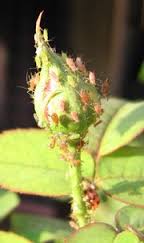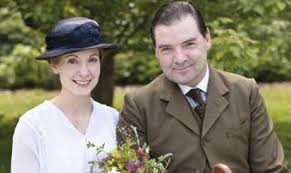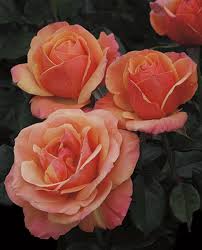In spite of my love of and occasional success with flowers and plants, I have a checkered history with roses. They are temperamental, picky, and have a general attitude that I don’t appreciate. Previous owners of our house apparently had little interest in landscaping; there was nothing other than grass in the back yard and a meager collection of scrubby evergreen bushes in the front—the sort of bushes that people who don’t want to give a second thought to watering or taking care of plants place in their yard. The only exception to this general ignoring of plants was two rose bushes—one on each side of the front steps.

Red on the south side which gets tons of sun; pink on the north side which gets very little. Both bushes did well for several years after we moved in, but during the past decade there have been fewer and fewer flowers, more and more spotted leaves, and this spring something new—little green worms who ate the insides out of the first few flower buds on the red rose bush. “A phids!” the guy at Lowe’s said; “very common on rose bushes.” He directed me toward seventeen different products designed to kick aphid ass and strongly advised me to get the most expensive one (I didn’t).
phids!” the guy at Lowe’s said; “very common on rose bushes.” He directed me toward seventeen different products designed to kick aphid ass and strongly advised me to get the most expensive one (I didn’t).
The product I did purchase worked and the early returns are positive—the red rose bush is cranking out better flowers than it has for years. The pink bush was so pathetic last year that in the fall I cut it back to the ground, fully expecting it not to survive the winter. Whoever originally planted this bush knew less about plants than I do, since it is clearly in the wrong spot—roses do like at least a few minutes of sun per day. I have restrained myself from just digging the thing up year after year, since it and its red companion might be as old as the house which was built in the 1940s. Against all odds, the pink bush did survive our relatively mild winter—barely—and is now growing a few new shoots from the mulch up, currently with one meagre bud. We’ll see if it survives Morgan natural selection for another year.
 Several weeks ago I received an email from my friend Marsue, announcing that she had a birthday present for Jeanne (whose birthday was not for another month) that she needed to transfer to us as soon as possible. Marsue is an Episcopal diocesan priest and had an all-day in-service close by that day, so we rendezvoused at lunchtime to make the exchange. Her gift for Jeanne was a Rose-in-a-box named “Anna’s Promise”—after the lovely and wonderful Anna from Downton Abbey.
Several weeks ago I received an email from my friend Marsue, announcing that she had a birthday present for Jeanne (whose birthday was not for another month) that she needed to transfer to us as soon as possible. Marsue is an Episcopal diocesan priest and had an all-day in-service close by that day, so we rendezvoused at lunchtime to make the exchange. Her gift for Jeanne was a Rose-in-a-box named “Anna’s Promise”—after the lovely and wonderful Anna from Downton Abbey.  This was an appropriate selection, since the love of Anna and Mr. Bates was one of our favorite story lines in the show. Furthermore, a Buzzfeed quiz once told me that if I were a Downton Abbey character, I would be Bates. Other than both being quite attractive, Jeanne and Anna are not very similar; the same Buzzfeed quiz told Jeanne that she would be Lord Grantham.
This was an appropriate selection, since the love of Anna and Mr. Bates was one of our favorite story lines in the show. Furthermore, a Buzzfeed quiz once told me that if I were a Downton Abbey character, I would be Bates. Other than both being quite attractive, Jeanne and Anna are not very similar; the same Buzzfeed quiz told Jeanne that she would be Lord Grantham.
The Anna’s Rose propaganda on the box promised that the bush would produce “Large, novel tan flowers with a copper reverse, exhibiting a sweet & spicy, fruity fragrance that will freshen up your garden”— a description probably written by the same people who write descriptions for the labels on wine bottles. Upon opening the box, I found a plant as bare and naked as Ezekiel’s dry bones. Three or four sticks upward and an equal number of them down; it took me a few moments to figure out which sticks were the branches and which were the roots. I had tried a plant-in-a-box a few times before, with consistently poor results, so I was not optimistic about Anna’s prospects. She came with extensive planting instructions, which I largely ignored. I followed my usual new plant regimen—dig a hole twice as large as the roots, throw in some manure, put the dirt back in, cover with mulch, and water. We agreed that the best location for Anna’s home would be next to the red rose bush; I planted her and we waited.
a description probably written by the same people who write descriptions for the labels on wine bottles. Upon opening the box, I found a plant as bare and naked as Ezekiel’s dry bones. Three or four sticks upward and an equal number of them down; it took me a few moments to figure out which sticks were the branches and which were the roots. I had tried a plant-in-a-box a few times before, with consistently poor results, so I was not optimistic about Anna’s prospects. She came with extensive planting instructions, which I largely ignored. I followed my usual new plant regimen—dig a hole twice as large as the roots, throw in some manure, put the dirt back in, cover with mulch, and water. We agreed that the best location for Anna’s home would be next to the red rose bush; I planted her and we waited.
And nothing happened. Days turned into weeks, and Anna still looked like a pile of dry bones. After a couple of weeks, around the time that new plants generally reveal if they plan to survive, Marsue started emailing. “How’s the rose bush doing?’ “It’s doing nothing,” I said each time, eventually confiding that I was pretty sure that Anna was dead. Her box might actually have been a coffin. This, of course, was a disappointment to all parties involved—to me because it was an indictment of my plant skills, to Marsue because she gave a dead plant to her friend for her birthday, and to Jeanne because she received a dead plant from her friend for her birthday. More than a month after the planting and a day or so before she left for a three-week conference, Jeanne confessed that she prayed for Anna.  My complicated history with prayer did not cause me to leap to the conclusion that signs of life were immanent. A week after Jeanne left, now about six weeks since the planting, Anna was still dormant, comatose, or dead. Then a miracle occurred.
My complicated history with prayer did not cause me to leap to the conclusion that signs of life were immanent. A week after Jeanne left, now about six weeks since the planting, Anna was still dormant, comatose, or dead. Then a miracle occurred.
I was weeding the plant beds in front of the house and noticed Anna looking pathetic and dead; I considered pulling her up then and there, but decided to wait until Jeanne got home in a week. Two days later I was mowing the lawn and noticed that not only was Anna showing signs of life for the first time, but she had a lot of leaves on every branch I had assumed was dead. I took a picture and emailed Jeanne and Marsue: LOOK AT THIS—SHE’S ALIVE!! Jeanne took full credit for having raised Anna from the dead with her prayers; whatever happened, she’s sporting more leaves every day and I can now tell where her first flower-bearing stalk is going to be.
Jeanne took full credit for having raised Anna from the dead with her prayers; whatever happened, she’s sporting more leaves every day and I can now tell where her first flower-bearing stalk is going to be. Anna’s probably sick of my checking her out three times a day, but I’ll bet that’s what Mary and Martha did when Lazarus rose from the dead as well.
Anna’s probably sick of my checking her out three times a day, but I’ll bet that’s what Mary and Martha did when Lazarus rose from the dead as well.
In a subsequent email, Marsue noted that there was something Biblical in the saga of Anna and she expected a blog post about it. I thought similarly and had already started typing in a few thoughts. Here’s what I think—Anna’s a good example of how things that are apparently dead are often simply taking their time gathering inner strength for a reawakening. As I have frequently written about in this blog, I am a case in point. Life is always a possibility for even those things and people who are, to all appearances, corpses. I gave a sermon once a few years ago about how this happened for me on a Sunday when the gospel reading was the raising of Lazarus.
Death and resurrection is part of the world we live in. It is part of each of us. There is no guarantee that Anna will produce spectacular roses—she may not produce any at all. But she’s a reminder of how things work in the larger scheme of things. Death is never the final word and there’s always the possibility of new life. The tag that was attached to the apparently dead Anna when I took her from her box/coffin read
“Anna’s Promise” praises the true heart and steadfast love that transcends the trials and tribulations endured by Downton Abbey’s character Anna Bates.
At the heart of my faith is the belief that such a transcendent, steadfast love is the backdrop for this often disappointing and difficult world that we find ourselves in. May it be so.












